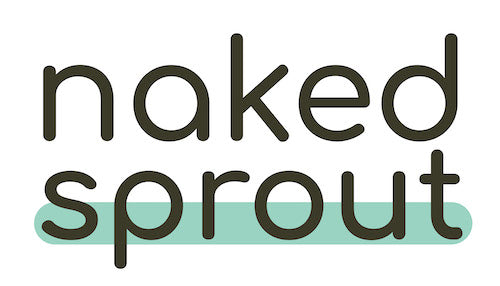Toilet Paper Comparison
They’re soft, they’re perforated, they’re not very exciting. You probably don’t want to spend forever thinking about toilet rolls but it’s good to know they’re affordable, gentle, and produced in a way that’s as sustainable as possible.
The final point can be tricky; sustainability is not always easy to judge. There’s a lot of different toilet rolls on the market, with many competing claims and plenty of greenwashing. So how do you know which toilet rolls, among the 8 billion used every year in the UK, are really sustainable?
Here’s what we know about some common categories of toilet rolls sold in the UK, the way they’re produced, and what makes Naked Sprout the UK’s most sustainable option.

How is toilet paper made?
We’ll start with the most common type of toilet roll found in UK homes, the ones we pick up from the supermarket.
The typical toilet roll sold by UK supermarkets is manufactured using fossil fuels, and made from trees that are commercially farmed for manufacturing purposes. Tree-farming is land and resource intensive and simply not necessary when there are much more sustainable materials available. We think it’s shocking that millions of trees are felled every year for a product that is literally flushed down the drain.
We also see far too much plastic wrapping, dyes, sometimes even fragrances as well! All of these have to be manufactured, often with highly polluting processes, and then disposed of. Most plastic wrapping goes to landfill, and the tissues themselves, including the chemicals used to make them, go into our drains.
And finally, we should mention the bleach used to change the natural colour of the raw materials to a bright white. It’s not gentle on the environment, and it may not be gentle on us either. Recent studies suggest links between the bleach used in toilet rolls and a range of minor and serious health complaints. We understand that white rolls have been the default standard on our shelves for a long time, but are they really worth it?

How is recycled toilet paper made?
Moving to more environmentally-friendly products we have recycled toilet rolls made in the UK. Many customers ask us about these, because they sound like the most sustainable option.
Using recycled paper and cardboard for toilet rolls is definitely better than making products from virgin trees. But when we looked into it we were surprised to learn that the collection and transportation of recycled material is actually not very different to the emissions from more traditional timber sources. This is because most timber pulp will make one journey to its final destination for manufacture, whereas recycled material is gathered from many scattered locations, normally by truck. If we look at the example of our bamboo toilet paper, our emissions from transporting bamboo by sea to our factory are actually slightly lower than sourcing recycled material from Europe.
And transport is not the main source of emissions. Recycled rolls manufactured in the UK are still manufactured using fossil fuels, and we will still plastic wrapping, and plenty of bleach.

How is bamboo toilet paper made?
The other category of toilet roll our customers ask about are those of our more direct competitors, the bamboo toilet rolls that are manufactured in China. Again, the materials here are better than standard supermarket rolls, with many brands using only bamboo or recycled material in the tissues themselves (though where you see wrapped rolls the wrapping is often virgin paper). And we love to see toilet rolls that donate to charity, like we do with every box we sell.
With similar raw materials and similar claims about sustainability you might think there’s not much in it.
But there is still a big difference to be made here, and you can see it when you look closely at the manufacturing process. All of the rolls we’ve highlighted will be manufactured using all or mostly fossil fuels. This isn’t a big surprise, it’s how most manufacturing is done and is still sadly cheaper than setting up a more renewable process. But with tissue products, the impact is severe. To make any tissue or paper products, raw pulp must be shaped and then dried, using machines that are like industrial scale hair dryers. The energy requirement is huge - and using fossil fuels to power these machines in the traditional way generates a lot of carbon emissions.
To address this you will often see more environmentally-conscious brands turning to offsetting; addressing their carbon debt by supporting tree-planting initiatives. But the effectiveness of these programs is being urgently called into question, and continuing to use the same old polluting processes of manufacturing doesn’t do anything to address the problems at the root of our climate and sustainability crisis.
So we have renewable materials and more charitable giving, but we’re still seeing bleach, unnecessary wrapping, and a fossil-fuel intensive process that may or may not be addressed by offsetting.
How do we do better?

How is Naked Sprout different?
At Naked Sprout we are prioritising sustainability in every part of our design and manufacturing, we are harnessing the everyday toilet roll to bring about huge changes.
Naked Sprout toilet rolls are made from renewable materials, with no bleach or harsh chemicals, in a European factory, in which everyone is paid a living wage. We have 50% lower emissions than other eco brands and that’s not by offsetting, it’s by setting up 100% renewable onsite energy generation at our factory. Naked Sprout is produced ethically, sustainably, and is so free from harsh chemicals the final product is certified “food safe”.
As far as we know we’re the only company in the world that manufactures toilet roll in this way, and you don’t have to take our word for it. Our B Corp score of 128.4 is the highest in our sector.
Shop Naked Sprout Toilet Roll here


